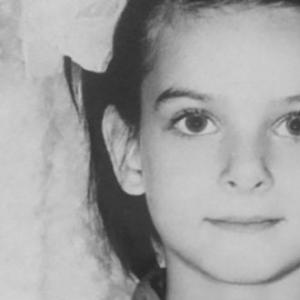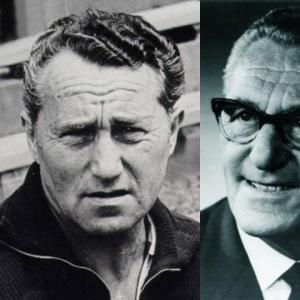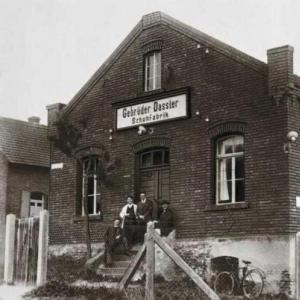How Prince Vasily II became the “Dark One”. Vasily II the Dark - brief biography of Vasily 2, what he became famous for
Moscow Prince Vasily II the Dark ruled in an era when his principality gradually became the core of a unified Russian state. The period of this Rurikovich's reign also saw a major internecine war between him and his relatives - contenders for power in the Kremlin. This feudal conflict was the last in the history of Rus'.
Family
The future Prince Vasily 2 the Dark was the fifth son of Vasily I and Sofia Vitovtovna. On the maternal side, the child was a representative of the Lithuanian ruling dynasty. On the eve of his death, Vasily I sent a letter to his father-in-law Vitovt, in which he asked him to protect his young nephew.
The first four sons of the Grand Duke died in childhood or youth from a disease that was common at that time, which is known in the chronicles as “pestilence.” Thus, Vasily 2 the Dark remained the heir of Vasily I. From a state point of view, having a single offspring was only a plus, because it allowed the ruler not to divide his power among numerous children. Because of this appanage custom, Kievan Rus had already perished and the Vladimir-Suzdal land had suffered for many years.
Political situation
The Principality of Moscow had a doubly need to remain united due to foreign policy threats. Despite the fact that Vasily II's grandfather Dmitry Donskoy defeated the Tatar-Mongol army in 1380, Rus' remained dependent on the Golden Horde. Moscow remained the main Slavic Orthodox political center. Its rulers were the only ones who could resist the khans, if not on the battlefield, then through compromise diplomacy.
From the west, the East Slavic principalities were threatened by Lithuania. Until 1430, it was ruled by Vytautas, the grandfather of Vasily II. During the decades of fragmentation of Rus', Lithuanian rulers were able to annex the Western Russian principalities (Polotsk, Galicia, Volyn, Kiev) to their possessions. Under Vasily I, Smolensk lost its independence. Lithuania itself was increasingly oriented towards Catholic Poland, which led to an inevitable conflict with the Orthodox majority and Moscow. Vasily II needed to balance between dangerous neighbors and maintain peace within his state. Time has shown that he did not always succeed in this.
Conflict with uncle
In 1425, Prince Vasily Dmitrievich died, leaving a ten-year-old son on the throne. The Russian princes recognized him as the main ruler of Rus'. However, despite the expressed support, little Vasily’s position was extremely precarious. The only reason why no one dared to touch him was his grandfather - the powerful Lithuanian sovereign Vytautas. But he was quite an old man and died in 1430.
What followed was a whole chain of events that led to a major internecine war. The main culprit of the conflict was Vasily II's uncle Yuri Dmitrievich, the son of the legendary Dmitry Donskoy. Before his death, the winner Mamai, according to tradition, bequeathed inheritance to his youngest offspring. Understanding the danger of this tradition, Dmitry Donskoy limited himself to giving Yuri small cities: Zvenigorod, Galich, Vyatka and Ruza.
The children of the deceased prince lived in peace and helped each other. However, Yuri was known for his ambition and love of power. According to his father's will, he was supposed to inherit everything in the event of the premature death of his elder brother Vasily I. But he had five sons, the youngest of whom became the ruler of the Kremlin in 1425.
All this time, Yuri Dmitrievich remained an insignificant prince of Zvenigorod. The Moscow rulers managed to preserve their state and expand it due to the fact that the order of succession was legalized, according to which the throne passed from father to eldest son, bypassing younger brothers. In the 15th century, this order was a relative innovation. Before this, in Rus', power was inherited according to the right of ladder, or the right of seniority (that is, uncles had priority over nephews).
Of course, Yuri was a supporter of the old order, since it was they who allowed him to become a legitimate ruler in Moscow. In addition, his rights were supported by a clause in his father's will. If we remove particulars and personalities, then in the Moscow principality under Vasily II two systems of inheritance collided, one of which was supposed to sweep away the other. Yuri was just waiting for the right moment to declare his claims. With the death of Vitovt, this opportunity presented itself to him.
Court in Orda
During the years of Tatar-Mongol rule, the khans issued grants that gave the Rurikovichs the right to occupy one or another throne. As a rule, this tradition did not interfere with the usual succession to the throne, unless the applicant was insolent to the nomads. Those who disobeyed the khan's decisions were punished by having their lot attacked by a bloodthirsty horde.
The descendants of Dmitry Donskoy still received labels for reign and paid tribute, even though the Mongols also began to suffer from their own civil strife. In 1431, the grown-up Vasily II the Dark went to the Golden Horde to receive his permission to rule. At the same time, Yuri Dmitrievich went to the steppe with him. He wanted to prove to the khan that he had more rights to the Moscow throne than his nephew.
The ruler of the Golden Horde, Ulu-Muhammad, resolved the dispute in favor of Vasily Vasilyevich. Yuri suffered his first defeat, but was not going to give in. In words, he recognized his nephew as his “elder brother” and returned to his native land to wait for a new opportunity to strike. Our history knows many examples of perjury, and in this sense, Yuri Dmitrievich was not much different from many of his contemporaries and predecessors. At the same time, Vasily also broke his promise. At the khan's trial, he promised his uncle to give the city of Dmitrov as compensation, but he never did.

The beginning of civil strife
In 1433, the eighteen-year-old Moscow prince got married. The wife of Vasily II was Maria, the daughter of the appanage ruler Yaroslav Borovsky (also from the Moscow dynasty). Numerous relatives of the prince were invited to the celebrations, including the children of Yuri Dmitrievich (he himself did not appear, but remained in his Galich). and Vasily Kosoy will still play their serious role in the internecine war. For now they were guests of the Grand Duke. In the midst of the wedding, a scandal broke out. The mother of Vasily II, Sofya Vitovtovna, saw on Vasily Kosoy a belt that supposedly belonged to Dmitry Donskoy and was stolen by the servants. She tore off an item of clothing from the boy, which caused a serious quarrel between relatives. The insulted sons of Yuri Dmitrievich urgently retreated and went to their father, causing a pogrom in Yaroslavl along the way. The episode with the stolen belt became the property of folklore and a popular plot in legends.
A domestic quarrel became the very reason that the Zvenigorod prince was looking for to start a serious war against his nephew. Having learned about what happened at the feast, he gathered a loyal army and went to Moscow. The Russian princes again prepared to shed the blood of their subjects for the sake of personal interests.
The army of the Grand Duke of Moscow was defeated by Yuri on the banks of the Klyazma. Soon my uncle occupied the capital. Vasily received Kolomna as compensation, where, in fact, he ended up in exile. Finally, Yuri fulfilled his old dream of his father's throne. However, having achieved what he wanted, he made several fatal mistakes. The new prince came into conflict with the capital's boyars, whose influence in the city was extremely great. The support of this class and their money were then very important attributes of power.
When the Moscow aristocracy realized that its new ruler had begun to force old people out of office and replace them with his own candidates, dozens of key supporters fled to Kolomna. Yuri found himself isolated and cut off from the capital's army. Then he decided to make peace with his nephew and agreed to return the throne to him after several months of reign.
But Vasily was not much more intelligent than his uncle. Returning to the capital, he began open repressions against those boyars who supported Yuri in his claims to power. Opponents made the same mistakes, not taking into account the sad experience of their opponents. At the same time, the sons of Yuri declared war on Vasily. The Grand Duke was again defeated near Rostov. His uncle again became the ruler of Moscow. However, a few months after the next castling, Yuri died (June 5, 1434). There were persistent rumors throughout the capital that he was poisoned by one of his close associates. According to Yuri's will, his eldest son Vasily Kosoy became prince.

Vasily Kosoy in Moscow
Throughout Yuri's reign in Moscow, Vasily Vasilyevich 2 was on the run, unsuccessfully fighting against his sons. When Kosoy informed his brother Shemyaka that he was now ruling in Moscow, Dmitry did not accept this change. He made peace with Vasily, according to which, if the coalition was successful, Shemyak received Uglich and Rzhev. Now the two princes, who had previously been opponents, united their armies to expel the eldest son of Yuri of Zvenigorod from Moscow.
Having learned about the approach of the enemy army, he fled from the capital to Novgorod, having previously taken his father’s treasury with him. He reigned in Moscow for only one summer month in 1434. While on the run, the exile gathered an army with the money he took and went with it towards Kostroma. First, it was defeated near Yaroslavl, and then again in the Battle of the Cherekha River in May 1436. Vasily was captured by his namesake and barbarously blinded. It was because of his injury that he received the nickname Scythe. The former prince died in captivity in 1448.

War with the Kazan Khanate
For some time, peace was established in Rus'. The Grand Duke of Moscow Vasily II tried to prevent war with his neighbors, but he failed. The cause of the new bloodshed was the Kazan Khanate. By this time, the united Golden Horde was divided into several independent uluses. The Kazan Khanate became the largest and most powerful. The Tatars killed Russian merchants and periodically organized campaigns against the border areas.
In 1445, an open war broke out between the Slavic princes and the Kazan Khan Mahmud. On July 7, a battle took place near Suzdal, in which the Russian squad suffered a crushing defeat. Mikhail Vereisky and his cousin Vasily II the Dark were taken prisoner. The years of this prince's reign (1425-1462) were full of episodes when he was completely deprived of power. And now, finding himself in the khan’s captivity, he was briefly cut off from events in his homeland.
Hostage of the Tatars
While Vasily remained a hostage to the Tatars, the ruler of Moscow was Dmitry Shemyaka, the second son of the late Yuri Zvenigorodsky. During this time, he acquired numerous supporters in the capital. Meanwhile, Vasily Vasilyevich persuaded the Kazan Khan to release him. However, he had to sign an enslaving agreement, according to which he had to pay a huge indemnity and, even worse, give several of his cities to the Tatars for feeding.
This caused a wave of indignation in Rus'. Despite the grumbling of many residents of the country, Vasily II the Dark began to rule again in Moscow. The policy of concessions to the Horde could not but lead to disastrous consequences. In addition, the prince came to the Kremlin at the head of the khan’s army, which was given to him by the Tatars, in order to be sure to return the throne.
Dmitry Shemyaka, after the return of his opponent, retired to his Uglich. Very soon, Moscow supporters began to flock to him, among whom were boyars and merchants, dissatisfied with Vasily’s behavior. With their help, the Uglitsky prince organized a coup, after which he again began to rule in the Kremlin.
In addition, he enlisted the support of some appanage princes who had previously refrained from conflict. Among them were the Mozhaisk ruler Ivan Andreevich and Boris Tverskoy. These two princes helped Shemyaka treacherously capture Vasily Vasilyevich within the sacred walls of the Trinity-Sergius Lavra. On February 16, 1446, he was blinded. The reprisal was justified by the fact that Vasily conspired with the hated Horde. In addition, he himself once ordered the blinding of his enemy. Thus, Shemyaka took revenge for the fate of his older brother Vasily Kosoy.

After being blinded
After this episode, Vasily 2 the Dark was sent into exile for the last time. In short, his tragic fate gained him more supporters among the wavering aristocracy. The blinding also brought to reason the majority of the princes outside the Moscow state, who became ardent opponents of Shemyaka. Vasily 2 the Dark took advantage of this. Why the Dark One got his nickname is known from the chronicles, which explain this epithet by blindness. Despite the injury, the prince remained active. His son Ivan (the future Ivan III) became his eyes and ears, helping in all state affairs.
By order of Shemyaka, Vasily and his wife were kept in Uglich. Maria Yaroslavna, like her husband, did not lose heart. When supporters began to return to the exiled prince, a plan to capture Moscow matured. In December 1446, Vasily and his army occupied the capital; this happened at a time when Dmitry Shemyaka was away. Now the prince finally established himself in the Kremlin until his death.
Our history has seen many civil strifes. More often than not, they ended not in compromise, but in the complete victory of one of the parties. In the middle of the 15th century the same thing happened. Shemyaka gathered an army and prepared to continue the fight with the Grand Duke. A few years after Vasily returned to Moscow, on January 27, 1450, the Battle of Galich took place, which historians consider the last internecine battle in Rus'. Shemyaka suffered an unconditional defeat and soon fled to Novgorod. This city often became a shelter for exiles. Residents did not extradite Shemyaka, and he died of natural causes in 1453. However, it is possible that he was secretly poisoned by Vasily’s agents. Thus ended the last civil strife in Rus'. Since then, the appanage princes had neither the means nor the ambitions to resist the central government.

Peace with Poland and Lithuania
At a young age, Prince Vasily II the Dark was not distinguished by his foresight. He did not spare his subjects in the event of war and often made strategic mistakes that became the cause of bloodshed. The blinding changed his character greatly. He became humble, calm and maybe even wise. Having finally established himself in Moscow, Vasily set about building peace with his neighbors.
The main danger was the Polish king and Lithuanian prince Casimir IV. In 1449, an agreement was concluded between the rulers, according to which they recognized established borders and promised not to support their neighbor’s competitors within the country. Casimir, like Vasily, faced the threat of internecine war. His main opponent was Mikhail Sigismundovich, who relied on the Orthodox part of Lithuanian society.
Treaty with the Novgorod Republic
Subsequently, the reign of Vasily 2 the Dark continued in the same vein. Due to the fact that Novgorod sheltered Shemyaka, the republic found itself in isolation, which, according to the agreement, was supported by the Polish king. With the death of the rebellious prince, ambassadors arrived in Moscow with a request to lift the trade embargo and other decisions of the prince, because of which the life of the townspeople was greatly complicated.
In 1456, the Yazhelbitsky Peace Treaty was concluded between the parties. He secured the vassal position of the Novgorod Republic from Moscow. The document again de jure confirmed the leading position of the Grand Duke in Rus'. Later, the treaty was used by Vasily's son Ivan III to annex the rich city and the entire northern region to Moscow.

Results of the board
Vasily the Dark spent the last years of his life in relative peace and quiet. He died in 1462 from tuberculosis and improper treatment for this scourge. He was 47 years old, 37 of which he (with interruptions) was a Moscow prince.
Vasily managed to eliminate small fiefs within his state. He increased the dependence of other Russian lands on Moscow. An important church event took place under him. By order of the prince, he was elected metropolitan. This event marked the beginning of the end of the dependence of the Moscow Church on Constantinople. In 1453, the capital of Byzantium was taken by the Turks, after which the actual center of Orthodoxy moved to Moscow.

Vasily II Vasilievich Dark
Years of life: 1415-1462
Reign: 1432-1446, 1447-1462
From the Rurik dynasty. From the family of Moscow Grand Dukes. Son of Grand Duke Vasily I Dmitrievich and Princess of Lithuania . Grandson .
Vasily Dark became a Moscow prince at the age of 9, after the death of his father Vasily I Dmitrievich in 1425. The real power was with the widow princess Sofia Vitovtovna, boyar I.D. Vsevolozhsk and Metropolitan Photius. However, Vasily’s uncles, Yuri, Andrey, Peter and Konstantin Dmitrievich, applied for the leadership. At the same time, Yuri Zvenigorodsky, according to the will of his father Dmitry Donskoy, was to receive a great reign after the death of his brother, Vasily I Dmitrievich.
Both sides began preparing for an internecine war, but agreed on a temporary truce and in 1428 entered into an agreement according to which the 54-year-old uncle Yuri Zvenigorodsky recognized himself as the “younger brother” of the 13-year-old nephew Vasily Vasilyevich. Sofya Vitovtovna took advantage of the influence of her father Vitovt, after which it was difficult for Yuri to persist in his desire to take the throne.
Prince Vasily the Dark
The beginning of the reign of Vasily Vasilyevich was marked by a plague epidemic and a terrible drought in 1430, 1442 and 1448. The reign of Vasily II Vasilyevich all his life took place in conditions of a long internecine struggle for power with the Prince of Zvenigorod Yuri Dmitrievich, and then with his son.
In 1430, Yuri dissolved the peace, taking advantage of the death of the actual head of Metropolitan Photius, as well as Vasily Vasilyevich’s grandfather, Vitovt. Yuri Dmitrievich went to the Horde to sue Vasily. Vasily Vasilyevich also hastily went to the horde with his boyars.
In the spring of 1432, the rivals appeared before the Tatar princes. Yuri Yuryevich defended his rights according to the right of ancient tribal custom, referring to the chronicles and the will of his father Donskoy. From Vasily’s side, Ivan Dmitrievich Vsevolozhsky spoke about rights; with skillful flattery he was able to persuade the khan to give a label to Vasily.
Vsevolozhsky hoped that the Grand Duke would marry his daughter. But upon arrival in Moscow, things took a different turn. Sofia Vitovna, the mother of Vasily Vasilyevich, insisted that her son become engaged to Princess Marya Yaroslavna, considering this marriage more profitable from different points of view. Vsevolzhsky harbored a grudge and left Moscow, and soon went over to Yuri’s side and became his adviser.
Vasily the Dark years of reign
After Vasily received the label, the struggle for power did not stop. In 1433, a battle took place between uncle and nephew on the banks of the river. Klyazma near Moscow, and Yuri won.
Yuri expelled Vasily from Moscow in 1433. Vasily II received the title  Prince of Kolomna. The city of Kolomna became the center of united forces that sympathized with the prince in his policy of “gathering Rus'.” Many Muscovites refused to serve Prince Yuri and came to Kolomna, which for some time became an administrative, economic and political state. Having received support, Vasily Vasilyevich was able to regain the throne in 1434 after the death of Yuri, but during the war he was deprived of it several more times.
Prince of Kolomna. The city of Kolomna became the center of united forces that sympathized with the prince in his policy of “gathering Rus'.” Many Muscovites refused to serve Prince Yuri and came to Kolomna, which for some time became an administrative, economic and political state. Having received support, Vasily Vasilyevich was able to regain the throne in 1434 after the death of Yuri, but during the war he was deprived of it several more times.
In 1436, Yuri's son Vasily Kosoy spoke out against Vasily II Vasilyevich the Dark, but was defeated, captured and blinded.
Basil II's refusal in 1439 to accept the Florentine union with the Roman Catholic Church was of great importance for the preservation of his own culture and statehood.
On July 7, 1445, in a battle near the outskirts of Suzdal, Vasily II Vasilyevich with the united Russian troops was defeated by Kazan troops under the command of the Kazan princes Mahmud and Yakub (sons of Khan Ulu-Muhammad). After which Vasily II and his cousin Mikhail Vereisky were taken prisoner, but on October 1, 1445 they were released. A large sum was given for them, and a number of cities were given to the Kazan princes. Under the terms of this enslaving agreement, the Kasimov Khanate was created within Russia, in Meshchera, the 1st khan of which was Tsarevich Kasim, the son of Ulu-Muhammad.
Why Vasily the Dark
In 1446 Vasily II was captured in the Trinity-Sergius Lavra and on February 16 at night on behalf of Dmitry Yuryevich Shemyaka, Ivan Mozhaisky and Boris Tverskoy and was blinded, after which he received the nickname “Dark”. Then, Vasily Vasilyevich and his wife were sent to Uglich, and his mother Sofya Vitovtovna was exiled to Chukhloma.
But Vasily II continued the war anyway. In 1447, Vasily received Martinian's blessing for a campaign against Dmitry Shemyaka, who had captured Moscow, by visiting the Ferapontov Monastery. With great difficulty, Vasily the Dark regained the Moscow throne, winning in the early 50s. XV century victory.
By order of Vasily II, in 1448, the Russian bishop Jonah was elected metropolitan, which became a sign of the declaration of independence of the Russian church from the Patriarch of Constantinople and strengthened the international position of Rus'.
After the death of Shemyaka in 1453, thanks to successful campaigns against Novgorod, Pskov and Vyatka, Vasily was able to restore the unity of the lands around Moscow, eliminating almost all the small fiefs within the Moscow principality.
Vasily II Vasilyevich the Dark died of a dry disease - tuberculosis in 1462 on March 27. Before his death, he wanted to become a monk, but the boyars dissuaded him. He was buried in Moscow in the Archangel Cathedral.
During the reign of Vasily the Dark, the city of Kazan was restored, the Kingdom of Kazan was founded and the Crimean Khanate arose.

The only wife of Vasily II since 1433 was Maria Yaroslavna, the daughter of the appanage prince Yaroslav Borovsky.
Vasily and Maria had 8 children:
- Yuri the Great (1437 – 1441)
- Ivan III (January 22, 1440 - October 27, 1505) - Grand Duke of Moscow from 1462 to 1505.
- Yuri Molodoy (1441 - 1472) - Prince of Dmitrov, Mozhaisk, Serpukhov.
- Andrei Bolshoi (1444-1494) - Prince of Uglitsky, Zvenigorod, Mozhaisk.
- Simeon (1447-1449).
- Boris (1449-1494) - Prince of Volotsk and Ruza.
- Anna (1451-1501).
- Andrei Menshoi (1452-1481) - Prince of Vologda.
Vasily Vasilyevich the Dark was born in 1415 in the family of Prince Vasily the First Dmitrievich. At the same time, he was the youngest son and at the time of his father’s death he was barely ten years old. Vasily, of course, had the right to the throne, but he The situation was quite unstable for the following reasons:
· the will of Dmitry Donskoy, according to which the right to the throne was assigned to Yuri Dmitrievich, uncle of Vasily II;
· presence of older children;
· young age as for a ruler.
In addition, the decision to inherit the Russian throne directly depended on Vytautas (Lithuanian prince), who was the guardian of the young Vasily after the death of Vasily the First. It was thanks to the will of the Lithuanian prince and the support of Metropolitan Photius that a peace treaty was concluded between nephew and uncle in 1425, according to which Vasily II occupied the throne, and Yuri denied all claims to him on his part. However, during the entire reign of Vasily, he was repeatedly overthrown by his uncle and his sons.
Vasily pursued a fairly careful foreign and domestic policy, because at that time Rus' was dependent on two powers - the Principality of Lithuania and the Golden Horde.
In 1426, Vytautas invaded the borders of Rus' and tried to conquer Pskov, and after failure, he tried to make peace with it. Being an ally of Pskov at that time, Vasily the Second is trying to soften the conditions of the Lithuanian peace, but also does not achieve success in this event.
Vasily had even more tense relations with Novgorod. So in 1435-1436, the Moscow prince tried to “smooth out” differences with Vasily Kosy, his cousin and ruler of Novgorod. To do this, he even has to give up part of his own lands to Novgorod, as well as a number of obligations, which he himself will later renounce after the defeat of his opponent. And already in 1347, Novgorod not only did not receive what Vasily had promised, but was also forced to pay taxes to Moscow, and in 1456 Novgorod fully recognized its own dependence on the Moscow principality.
Vasily II also had rather complicated relations with the Golden Horde. The ruler of Moscow regularly makes campaigns against the Horde, trying by military force to wrest from it the independence of Rus' from the Horde.
So, historians highlight the successful unification of Russian lands around Moscow, as well as some church innovations, as the prince’s main merits.
Vasily the Second died in 1462 from gangrene and tuberculosis. After the death of the prince, Ivan the Third ascended to the Russian throne.
Video lecture "Vasily II the Dark"
He was afraid of rivals, especially his brother, Prince Yuri Dmitrievich Galitsky. Indeed, this uncle of Vasily II, relying on the custom of seniority and the will of Dmitry Donskoy, was already gathering an army to fight for Moscow, but was forced to give in and promise not to seek the grand-ducal table personally, but only through the khan.
Later, Yuri had to refuse this and sign an agreement, recognizing himself as a younger brother to his nephew. But the enmity in the princely family did not subside. In 1431, taking advantage of the death of Vytautas, Yuri again presented his claims to the grand reign. The dispute had to be resolved in the Horde, where both princes had well-wishers. Vasily appeared with his smart boyar Ivan Dmitrievich Vsevolozhsky, and while Yuri Dmitrievich exhibited his rights, Vsevolozhsky pointed out to the khan that Vasily relied on everything the will of the khan and is looking for “the table of the great reign, and your ulus, according to your royal salary.” Such recognition of the khan’s unconditional will persuaded him to decide the matter in favor of Vasily, and in 1432 the latter returned from the Horde with Tsarevich Mansyr-Ulan, who installed him in Moscow for the great reign.
Soon Vsevolozhsky was offended by the preference given to Marya Yaroslavna, granddaughter Vladimir Andreevich Serpukhovsky, in front of his daughter, when Sofya Vitovtovna arranged the marriage of her son. This boyar went to Yuri. At the wedding feast itself (1433), Sophia insulted the sons of Yuri, Dmitry Shemyaka (born 1420) and Vasily Kosoy(born 1421), tearing off from the latter a precious belt that once belonged to the family of the Grand Dukes of Moscow. The brothers fled from the feast and, returning to their father, together with him and his large army moved towards Moscow. Vasily II fled to Kostroma, was captured there, but spared by Yuri, who settled in Moscow as a grand prince; Vasily received Kolomna as an inheritance.
Sofya Vitovtovna at the wedding of Grand Duke Vasily II. Painting by K. Goon, 1861
However, feeling the precariousness of his position, Yuri soon returned the throne to his nephew, and he himself retired to Galich, which a short time later was burned out by the vengeful Vasily. The strife continued unabated; Yuri once again captured the Moscow table (1434), but soon died. His sons continued the fight. Vasily Kosoy and Vasily II either made peace, then violated it, and finally, in 1436, the first treacherously attacked the Moscow prince, but was defeated, captured and blinded. Vasily concluded a peace treaty with Dmitry Shemyaka and allowed him to live freely, but without leaving the country and under supervision, in Kolomna.
In 1438, Khan Ulu-Makhmet, expelled from the Horde by his brother, came with the Tatars to the city of Belev; the Grand Duke sent an army against him, which the Tatars defeated. Ulu-Makhmet, having retired to the Volga, the next year captured Kazan, devastated by the Russians, and settled there. This is how the terrible beginning began later Kazan kingdom. Ulu-Makhmet constantly harassed the Moscow regions, and in 1445 the Tatars managed not only to inflict a serious defeat on the Russians on the banks of the river. Kamenki, near Suzdal, but also to capture the Grand Duke. Vasily was released from captivity only for a huge ransom, which caused displeasure among Muscovites.
Vasily II the Dark
Dmitry Shemyaka, who had been in contact with the Tatars even during the captivity of the Grand Duke, now decided to take advantage of the circumstances; chance helped him. Vasily II went with a small number of close associates to the Trinity Monastery to thank God for deliverance from captivity and to venerate the relics of St. Sergius. In the Trinity Monastery, he was captured by Shemyaka's accomplices, brought to Moscow and blinded, the Grand Duke's throne was seized by Dmitry, and Vasily, who now received the nickname of the Dark One due to his blindness, remained in captivity (1446).
But Shemyaka also did not feel secure on the Moscow table, especially in view of the murmurs about the villainy of Vasily’s blinding. Convinced by the Ryazan bishop Jonah, he freed Vasily II, who vowed not to seek the grand-ducal table, and released him to his granted fatherland - Vologda (1447). But Vasily did not keep his word, and in the same year his followers, who were only waiting for the release of the prince, elevated Vasily again to the Moscow table. Shemyaka fled to Galich and was forced to give “damned letters”, according to which, under the threat of church damnation, he renounced his claims to the great reign and swore not to harbor any evil towards the Grand Duke and his family.
But Shemyaka did not let up; Several times the Moscow army had to oppose him, until Dmitry was defeated near Galich. He fled to Novgorod, which gave him shelter. The Galician volost was annexed to Moscow and grand-ducal governors were appointed there (1450). In this struggle, Vasily was especially helped by the clergy with their authority and admonitions addressed both to Shemyaka and to his followers and concealers. At the head of the clergy was Metropolitan Jonah, who replaced the one who fled for the adoption of the Union of Florence Isidora. Jonah excommunicated Shemyaka from the church. In 1452, Dmitry made another unsuccessful attempt to establish himself in Ustyug, again fled to Novgorod and soon died (1453), most likely poisoned. Shemyaka's allies fled to Lithuania or, having made all kinds of concessions, made peace with Vasily the Dark.
The Grand Duke, who had long been at odds with the Novgorodians, decided to turn his forces against them. First, he imposed a tribute of up to 8,000 rubles on Novgorod, then in 1456 he moved the army. Novgorodians near Rusa were defeated Prince Striga Obolensky and Fyodor Basenko. In Yazhelbitsy, where the prince himself stood, an agreement was concluded on difficult terms; in addition to the promise not to accept the enemies of the Grand Duke, the payment of 10,000 rubles to him alone, they laid down: “there will be no veche letters” and “there will be no seal of the great princes.” After 1460, the liberties of Pskov were limited; governors were sent there from Moscow.
Vasily the Dark died on March 27, 1462 from wounds received during the treatment of “dry disease” by cauterization of the body. He had eight children from his wife, Marya Yaroslavna, of whom the second, Ivan, after the death of the eldest, was declared co-ruler from 1450, and then took his father’s table.
During the reign of Vasily the Second the Dark, the Russian land was dependent on two tyrants at once - the Principality of Lithuania and the Golden Horde.
In 1426, Vitovit, a Lithuanian prince crossed the borders of Rus' and attempted to capture Pskov. However, it was not successful. At the same time, after his defeat, he offers Pskov to conclude an agreement. At that time, Vasily was an ally of Pskov and he took advantage of the situation and softened the treaty with Lithuania, but could not achieve any success.
Another problem in the prince’s domestic policy was relations with Novgorod. So in 1435-1436, Vasily moves towards rapprochement with his uncle’s son Vasily Kosy, who rules in Novgorod. In order to completely avoid any clashes, Vasily the Second transfers part of the lands to Novgorod, also giving profitable obligations, which the prince later refused (after the defeat of his opponent).
In 1347, Veliky Novgorod, in addition to not receiving the promised privileges, was obliged to pay a huge tribute to Moscow.
Three years later, Vasily again launched a military campaign against Novgorod due to the fact that the Novgorodians had entered into a secret alliance with Lithuania. Once again the city was defeated, followed in 1441 by a new peace treaty and a huge tribute to Moscow.
In 1441, Vasily managed to conclude a peace treaty with the Polish king and the Lithuanian prince, and in 1449 Novgorod fully recognized its dependence on the Moscow principality.
The prince also had a rather difficult time with the Golden Horde. He tried in every possible way to defend independence from the Horde of Rus', regularly launching military campaigns against it.
In 1437, Vasily the Second sent an army to Belev, where Russian soldiers inflicted a crushing defeat on the Tatars, forcing them to enter into peace negotiations. At the same time, Rus' interrupts the negotiations, because it was confident in its own abilities. However, as a result, the Russian army was defeated.
Two years later, inspired by the defeat of the Russians in Belev, the Tatars approached Moscow and Vasily the Second was forced to leave the city, putting governor Yuri Patrikeevich in charge. But the Tatars failed to take Moscow. Until 1443, the Horde regularly carried out raids on Russian lands, destroying and ruining populated areas.
As you can see, the entire foreign and domestic policy of Vasily the Second was entirely aimed at expanding the territories of the Moscow Principality, as well as protecting its borders and unifying Russian lands.







